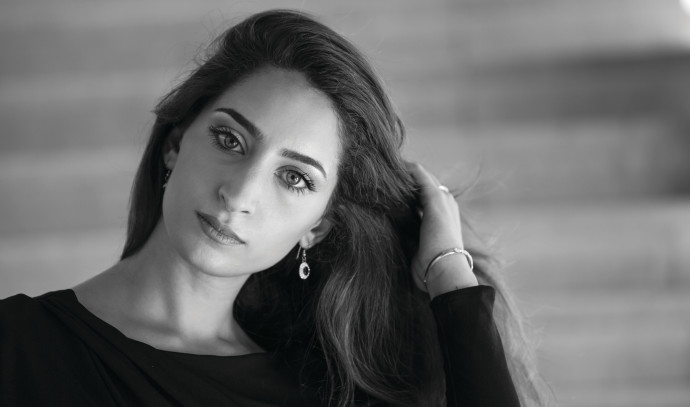Centuries ago women accused of indulging in witchcraft, by the Church or malicious individuals, were burned at the stake. Thankfully that particularly gruesome form of punishment largely faded out by the end of the 15th century, although heretics continued going up in flames for a while longer.
Still, as most of us will be aware, women around the world – even if they don’t cast spells or practice other forms of magic – tend to get a raw deal on all kinds of fronts. Average salaries for women still lag far behind that of men with, for example, female employees in the United States having to settle for 82 percent of their male counterparts’ payslips.
Witches Festival
Nour Darwish is keenly aware of the gender gap. The Israeli-citizen Palestinian soprano is one of the stars of the forthcoming Witches Festival which takes place in Jerusalem, Tel Aviv, Haifa, and Nazareth September 18-23. The event was founded two years ago by Jerusalem Baroque Orchestra (JBO) artistic director-conductor David Shemer with the JBO performing predominantly baroque scores. This year Shemer has spread the programmatic wings to incorporate non-Western material.
The accent is still predominantly on the orchestra’s titular genre with keyboardist Shemer spotlighting works by female composers from the baroque era, with some contemporary and culturally extraneous charts thrown into the mix. The five-day agenda takes in full orchestral concerts, chamber music, and more compact offerings. There are slots with women performers front and center, and compositions by such leading female figures of the period music scene as 18th-century Russian composer Anna Bon, late Baroque-era English composer, singer, and multi-instrumentalist Elisabetta de Gambarini, and Austrian composers, pianists, and singers Marianna Auenbrugger and Marianne Martines.
There will also be some enlightening cerebrally-oriented fare at the festival, with Dr. Ayelet Even-Ezra, a senior history lecturer at the Hebrew University, delivering a talk at Jerusalem’s Hansen House (September 18, 7 p.m.) with the titillating header of Medieval Demons. Even-Ezra will regale her audience with some of the ins and outs of the folk tradition, referencing women who took nocturnal flights of fancy and immersed themselves in the wonders of pagan goddesses.
Darwish’s contribution to Witches promises to provide the audience with a particularly diverse, intriguing, and entertaining time as she sings solo, as well as alongside Ukrainian-born fellow soprano Yana-Rachel Levi – and guitarist and arranger Gideon Brettler. The trio appears at Studio Annette in Tel Aviv on September 19 (8 p.m.) and at Hansen House on the morrow (8 p.m.).
The full concert title reads Fates – The Middle East Meets Eastern Europe, with the sopranos performing a suitably wide-ranging spread of sounds, textures, and rhythms that feed off divergent cultural baggage. Notwithstanding the contrast in the sources, both Darwish and Levi will aim to convey heightened emotion and a sense of longing for the female figures of their own cultures. The songs in their repertoire address romance, nostalgia, and maternal sentiments.
“The festival is about presenting works by women – and women from across a range of cultures – and bringing them together,” Darwish notes. Sounds like a harmoniously eclectic arrangement. The soprano received a supportive push in the desired direction from the festival founder.
“It all started from David. He told me there is a singer from the Ukraine, and that he thought we could do something special together.”
Darwish was not immediately taken with the idea.
“I asked him what connection there could possibly be between us. And David just said, let’s take a look. Let’s give it a chance.”
And so it came to be, despite the marked difference in the singers’ personal and cultural backdrops.
A gulf between fates
“There is a gulf between our fates, and we come from very different places,” says Darwish, with a nod to the concert moniker. Even so, there was some crucial common ground to feed off. “We are both women,” she notes. “And in order to deal with our trauma, and to understand the future, we need to carry on. That applies equally to men, and to whole nations.”
It can help, she observes, to get back to basics, in the widest most inclusive sense. “We need to return to the starting point, to our past, to the origin of our cultures, the songs, the questions we have, the existential questions.”
MUSIC HAS often been talked about in terms of a universal language that can unite us all across political, religious, and other divides although, of course, we all have our musical tastes and preferences. People brought up, for instance, on 1960s pop and rock or, for that matter, Western classical music, will initially probably find Arabic music challenging. It took me quite a few years to begin to appreciate the nuances of the latter and to go with the absence of harmony that is at the bedrock of Western sounds.
The Darwish-Levi confluence will follow a somewhat meandering path, starting from distinctly different vistas before the musical tributaries gradually converge and flow in unison. There is also plenty for the musical maven to enjoy.
“There are some virtuosic elements in my part of the concert,” Darwish explains, “particularly the song by [Egyptian singer] Asmahan.” That largely refers to the ultra-high chirping sounds the soprano has to produce. It is a diverse program.
“There are also songs with a more throaty-chesty delivery, and there are also songs with quartertones,” says Darwish, referencing one of the singular building blocks of Arabic music. That seems worlds away from Ukrainian folk material, but things become more accommodating as the concert progresses.
“We start far apart but we draw closer to one another. We get closer to each other’s music until we finally end up in a duet. We eventually bond. That was David’s idea from the start,” Darwish adds with a smile.
The soprano is keen to get on the stage with Levi and Brettler at Studio Annette and at Hansen House.
“Our guitarist is wonderful. He has written some wonderful arrangements. I have never seen arrangements like them, even by an Arab musician. It is going to be fascinating.”
Darwish is also looking forward to the yin-yang dynamic of the concert flow.
“There are, of course, contrasts between me and Yana, and we learn to embrace our differences as much as we can. It is a matter of constantly seeking the balance, looking to achieve peace, within ourselves and with each other, transposing that into the music and having mutual respect.”
Sounds like a wholesome recipe for good harmonious living all around.
For tickets and more information, jbo.co.il



